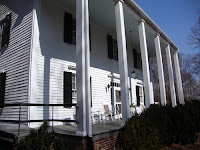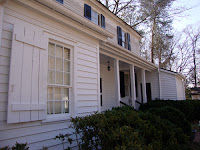 |
| Smith Plantation |
This post, the third of three, is about Smith Plantation.
I'll cover the logistics that are common to all three houses first and then move on to the house that is the topic of this particular post.
Roswell, Georgia, was founded by six families headed by Archibald Smith (of Smith Plantation); Barrington King (of Barrington Hall); James S. Bulloch (of Bulloch Hall); John Dunwoody; Nathan A. Pratt; and Elizabeth King Hand.
First, each home has a strict photography policy. You may make photographs of the exterior of the home only if they are for personal use. Photos of the interior are not permitted. Photos for commercial use require a permit (paperwork may be obtained at any of the homes), which costs $100. NOTE: Please do not use photos in this post for publication, anywhere…thank you (for keeping me policy-compliant).
 |
| 300 Year Old White Oak |
A rather unique feature offered at each of the Trilogy homes, one that I like very much, is self-guided "cell phone audio tours" of the homes' grounds. If you arrive after the guided tour starts, this is a wonderful option for exploring the grounds while waiting for the on-the-hour guided tour.
Signs are posted around the property with the dail-in number and location code. If you explore the grounds following your guided tour of the home, you can pick up a map of the audio tour stops inside the home. NOTE: the audio tour is free, but your applicable personal telephone plan charges will apply (great news for those with unlimited plans).
The audio tour includes information about the tour stop, as well as "letter readings" (letters to and from house residents from years past) at many of the stops.
Want a preview of the audio tour? You can listen to them, or a sampling of them, online.
The Arrival
 |
| Smith Plantation |
I arrived at Smith Plantation shortly before the 2:00 tour. I had time to visit a few of the out buildings on the grounds before having to be on the porch for the tour start time. I was also keeping an eye out for my new friend and tour companion who I'd met at Bulloch Hall.
 |
| Smith Plantation, porch |
The door opened and a bright and cheerful greeting came bursting forth from Jane. Jane was to become my favorite tour guide of the Trilogy…it wasn't long before we were chatting and discovering common interests, specific to the house.
My previous tour buddy ended up taking longer at lunch in Historic Roswell than she thought she would, but she kindly made the effort to bid a farewell between my tour and her tour. I love it when a total stranger becomes a friend so quickly, even if fleetingly brief.
The Families
Archibald Smith, his wife Anne, and their two children left the Georgia Coast (near Savannah) in 1838. The home, the Smith Plantation, was completed in 1845. Three generations of Smiths would live in the home. Unfortunately the final family there was the end of that family line.
 |
| Smith Plantation |
Of the third generation of Smiths, only one child married (Arthur), but not until he was 60 years old.
After Arthur's passing in 1960, the Smith's cook, Mamie Cotton, who ended up working for the family for 54 years, moved in to help take care of Mary. Upon Mary's passing, she left the house to the City of Roswell, but with the stipulation that Mamie could live out her life in the home. Mamie remained at the house and on Mary's payroll for the rest of her life.
The Home (the tour)
The house was built, by some of the 30 slaves who moved with the Smiths, approximately one mile from the town center and was an example of an upscale plantation home, for the time.
 |
| Smith Plantation |
The home is packed to the gills! It turns out that all three generations of the Smiths were "packrats," which translates into a significant amount of historical artifacts and documents.
One of the more interesting artifacts in the house is Willie's trunk from his time in the Confederate Army. The trunk was stored in the attic for quite a few years. When it was rediscovered, there was a list of its contents inside and, incredibly, nearly all the items were still in the trunk, save a few items that Willie had sent home to workers at the house.
 |
| Smith Plantation, Parson's Room right |
In 1940 at the bequest Mary, the home was remodeled. The porch was expanded to two stories high from one and indoor plumbing and electricity were added.
The Smith Plantation house also had a "Parson's Room" for travelers. A parson's room, usually on the back of the house, was available to travelers (oftentimes clergy) and usually unlocked for those who arrived after the family had retired for the evening.
Of the homes on the Trilogy tour, Smith Plantation has the largest collection of out buildings, numbering nearly 15, some from the 1840s and the latest added in 2001.
Typical of the time, a Cook House—the kitchen—was outside the main house. Partly because it was difficult to cool the house, but primarily because of the threat of fire, which did in fact happen. The Cook House burned down in 1863 but fortunately the fire did not spread to the main house because of heavy rain that night.
 |
| Smith Plantation, lamp post |
The Return
Do I think I'll return to Smith Plantation? Actually, I would like that very much. However, I think I will visit one house at a time of the Trilogy tour. Three in one day was a lot for research, but if for pure pleasure it would be fine. When I return, I hope that Jane is the tour guide that day…she was the ultimate!
Touring The Southern Trilogy: Smith Plantation
Date toured: Wednesday, February 16, 2011
Location: 935 Alpharetta Street, Roswell, Georgia (directions and map)
Parking: Free onsite parking
Cost: $8 Adults; $6 Children (or $18 for all three homes)
Hours: Monday-Saturday 10:00 a.m. – 3:00 p.m., Sunday 1:00 p.m. - 3:00 p.m. The last tour is at 3:00 p.m.
Events: The Smith Family and Civil War Exhibit, May 1 – December 31, 2011.
Website: http://www.roswellgov.com/index.aspx?NID=220
Location: 935 Alpharetta Street, Roswell, Georgia (directions and map)
Parking: Free onsite parking
Cost: $8 Adults; $6 Children (or $18 for all three homes)
Hours: Monday-Saturday 10:00 a.m. – 3:00 p.m., Sunday 1:00 p.m. - 3:00 p.m. The last tour is at 3:00 p.m.
Events: The Smith Family and Civil War Exhibit, May 1 – December 31, 2011.
Website: http://www.roswellgov.com/index.aspx?NID=220
 |
| Smith Plantation, porch |


2 comments:
Wonderful! Wish you could have posted photos of the interior! One more NOTE: The 300 year old white oak would have been a lot more impressive had it not been chopped down. ;)
Post a Comment